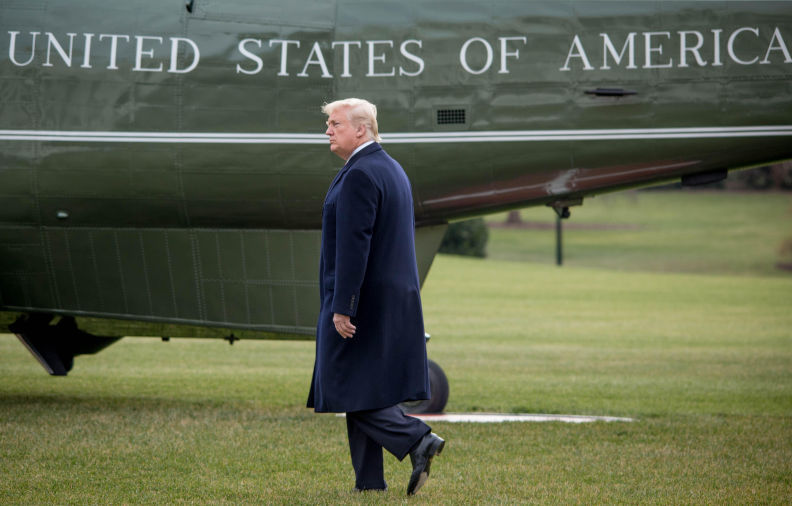With Trump in the White House, geopolitics has returned to the realm of great power relations.
The post-second world war Western world’s network of alliances, centred on the US, is being eclipsed by the “art of the deal”. Helpfully, Trump recognises the US’ tremendous power and is prepared to use it, but only in the US’ narrow interests.
Trump’s direct dealings with Putin in deciding Europe’s eastern front has about it the whiff of a Yalta 2.0. Yalta 1.0 was when in 1945 the great powers of the US, Great Britain and the Soviet Union gathered at the delightful Iranian seaside town of Yalta to carve up the world with a post-war settlement.
While there has been no world war and the other great power today, China, is not at the table, it is a harbinger of how things might be done in future under Trump 2.0. As Trump is speaking directly to Putin to do the deal, Europeans, with Britain looking to find some international role to lift it out of its post-Brexit irrelevance, are sidelined wringing their hands.
A ceasefire, roughly along the frontlines between Russia and Ukraine is likely. Security guarantees will have to come from Europe and Britain. Article 5 of NATO is effectively parked. From a realist position, as a great power that has a much bigger agenda with China, this is rational, albeit involving a hard-headed cold calculation.
Russia in no way poses an existential threat to the US. In important respects, the Europeans have grossly exaggerated the threat Russia poses to them. If 20% of contiguous Ukrainian territory is the best Russia can do after three years of massive loss of blood and treasure, Moscow credibly cannot be a threat to Poland or Germany.
Russia might threaten the Baltic states and other peripheral countries such as Moldova, but with a GDP 10 times Russia’s and a population nearly four times as big, from Trump’s perspective, the Europeans plus Britain are well positioned to provide security guarantees to Ukraine and any other vulnerable states on Europe’s eastern front.
Trump may well have a bigger agenda to deal with than Russia and Ukraine. During his election campaign, he explicitly stated that it was his intention to separate Russia and China. If as a first step this involves a ceasefire that is not just unfair to Ukraine in the eyes of much the world, but also morally wrong, that is unlikely to trouble Trump. The interests of great powers have always prevailed over other considerations.
The “Friendship Without Limits” between Beijing and Moscow has not been uttered again since it was first loudly proclaimed in February 2022. It is likely in time to be judged to have been a concert of convenience like the Von Ribbentrop-Molotov pact between Nazi Germany and the Soviet Union in 1939, which cleared the way for Hitler’s invasion of Poland and gave Stalin precious time to prepare for the inevitable German assault.
Western commentators blithely look past the history of conflicts, unresolved territorial issues, deep animosities among people along the respective borders, and, most importantly of all, changes in relative power between Russia and China, now decisively in China’s favour.
It is mistakenly asserted that because Xi and Putin share a sour attitude towards the West, and the US in particular, that they are bonded together forever. Trump evidently believes differently, and that Putin is in play if the price is right. Xi Jinping may believe so as well, judging by the hastily arranged telephone call with Putin following the recent US-Russia meeting in Saudi Arabia.
Since the end of World War II, the US has advanced its interests based on the notion of US exceptionalism. This in turn required the US to maintain primacy globally. For this time, it was a happy set of circumstances that US primacy worked well for countries that shared US values such as Australia, most of Europe at most times, and, of course, Britain, which, by the way, regards its “special relationship with the US” as even more special than Australia’s.
Trump seems not to care about US exceptionalism. Hence primacy is not of interest to him. What matters is the art of the deal, and the biggest deal of all is to be made with China. Just what that might look like has not been disclosed and it is likely that Trump and his team do not know either at this time.
Whatever emerges, however, will be unlikely to be welcomed by Australia. It is a safe bet that human rights, Xinjiang, Tibet, Taiwan and Hong Kong will be second order issues, or even lower, for Trump, if they are raised at all. Trump may feel that he faces such domestic political pressure over Taiwan that he will need to warn Xi to keep his hands off it. But then again, Xi has few, if any, military options for retaking Taiwan so it could be a cheap concession for him to make to Trump.
Just as with Yalta 1.0, the world order is being rearranged by the great powers. They have no wish to go to war against each other, but that is always on the cards. What is most likely, however, is that trade-offs will be made between them with little regard for those not at the negotiating table.
Republished from AFR, March 22,2025

Geoff Raby was Australia’s Ambassador to China from 2007-11, during which he visited all provinces in China officially. He served in Beijing as First Secretary (Economic) and then Counsellor (Economic), 1986-91. He was Ambassador to the WTO in Geneva, Ambassador to APEC, and Deputy Secretary, 2003-07. He was also head of the Trade Policy Issues Division of the OECD, Paris, 1993-95. He is a non-executive independent director of ASX listed-companies Yancoal, where he chairs the Health, Safety, Environment and Community Committee, and sits on the Board of the Gavan Foundaton.
His most recent book, Great Game On: the contest for central Asia and global supremacy, was published by Melbourne University Press on 12 November 2024. His previous book was China’s Grand Strategy and Australia’s Future in the World Order (MUP Nov 2020). He regularly contributes op eds and travel writing to the Australian Financial Review. He holds a PhD in economics. He was awarded the Order of Australia (AO) in June 2019 for services to Australia-China bilateral relations and to multilateral trade.

